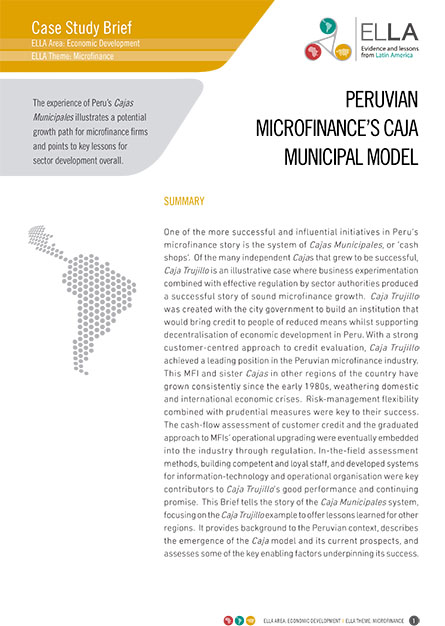Peruvian Microfinance’s Caja Municipal Model
| Año | : | 2013 |
|---|---|---|
| Autor/es | : | Miguel Jaramillo |
| Área/s | : | Empleo, productividad e innovación |
[2013] JARAMILLO, Miguel. Peruvian Microfinance’s Caja Municipal Model. ELLA. Economic Development, Microfinance, Policy Brief 4.
One of the more successful and influential initiatives in Peru’s microfinance story is the system of Cajas Municipales, or ‘cash shops’. Of the many independent Cajas that grew to be successful, Caja Trujillo is an illustrative case where business experimentation combined with effective regulation by sector authorities produced a successful story of sound microfinance growth. Caja Trujillo was created with the city government to build an institution that would bring credit to people of reduced means whilst supporting decentralisation of economic development in Peru. With a strong customer-centred approach to credit evaluation, Caja Trujillo achieved a leading position in the Peruvian microfinance industry. This MFI and sister Cajas in other regions of the country have grown consistently since the early 1980s, weathering domestic and international economic crises. Risk-management flexibility combined with prudential measures were key to their success. The cash-flow assessment of customer credit and the graduated approach to MFIs’ operational upgrading were eventually embedded into the industry through regulation. In-the-field assessment methods, building competent and loyal staff, and developed systems for information-technology and operational organisation were key contributors to Caja Trujillo’s good performance and continuing promise. This Brief tells the story of the Caja Municipales system, focusing on the Caja Trujillo example to offer lessons learned for other regions. It provides background to the Peruvian context, describes the emergence of the Caja model and its current prospects, and assesses some of the key enabling factors underpinning its success.






